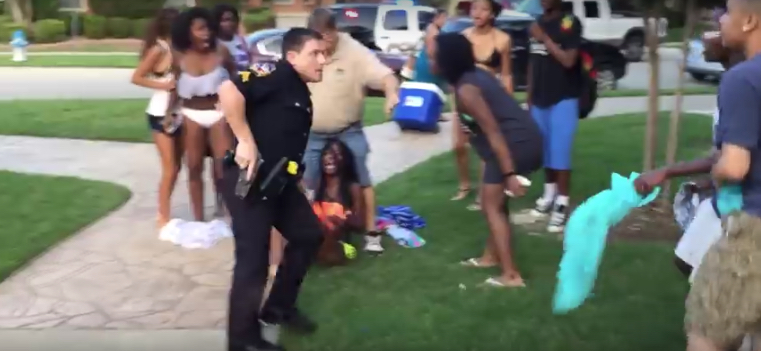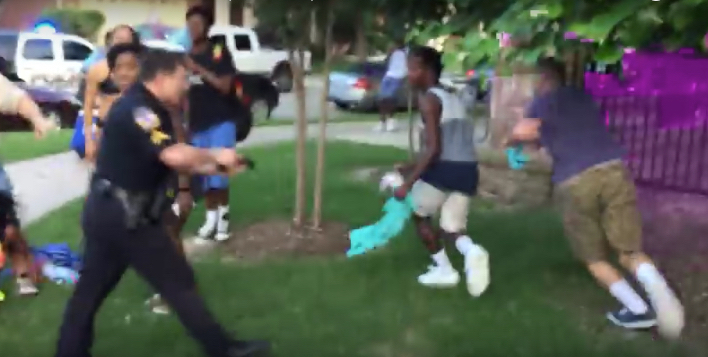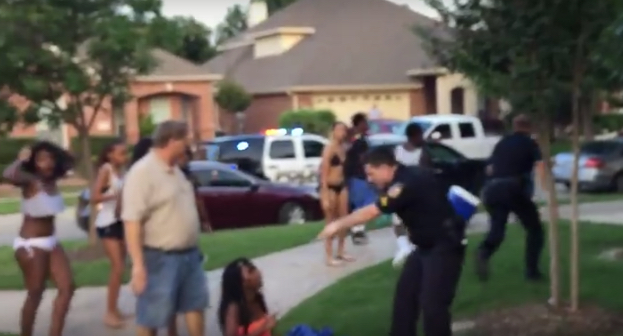Race Soldier McKinney [TX] Cop Terrorizes Black Teens @ Pool Party in Upscale Community: $5 Million Suit for Assaulting Black Girl
/The Psychopathic Racial Personality. By and large white people treat each other humanely. But in their relations with non-white people, many whites function as psychopaths. Dr. Bobby Wright has explained, 'the psychopath is an individual who is constantly in conflict with other persons or groups. He is unable to experience guilt, is completely selfish and callous, and has a total disregard for the rights of others. Psychopaths simply ignore the concept of right and wrong. By ignoring this trait in the White race (the lack of ethical and moral development) Blacks have made and are still making a tragic mistake in basing the worldwide Black liberation movement on moral suasion. It is pathological for Blacks to keep attempting to use moral suasion on a people who have no morality where race is the variable.' [MORE] Lawsuits against maniac white cops also have not stopped white supremacy/racism.

From [HERE] In a complaint filed in federal court last month a Black family is seeking damages of more than $5 million and alleging that a white McKinney police officer used excessive force while restraining a 15-year-old during the break-up of a pool party in 2015.
Cellphone videos taken by people at the pool showed the former police officer, David Eric Casebolt, who is white, running after black teens and ordering them to the ground, then forcing the teen girl, Dajerria Becton, onto her stomach and placing his knees on her back.
At one point, Casebolt drew his firearm after two young black men charged forward in apparent protest of the girl's treatment but holstered the weapon when two other officers intervened.
Casebolt was one of a dozen oficers who responded to the 911 disturbance calls at the pool. Casebolt resigned five days after the incident occurred. McKinney Police Chief Greg Conley called Casebolt’s actions at the pool “indefensible” and said “he came into the call out of control and the video showed he was out of control during the incident.” The
A grand jury declined to indict Casebolt in June 2016.
The complaint alleges that Casebolt used excessive force, committed assault and unlawfully detained a minor child, Dajerria Becton. The lawsuit also states that the city and police officials failed to provide McKinney officers with proper training and failed to provide adequate policy direction to protect residents from having their rights violated.
The party occurred on June 5, 2015, and was a celebration of the end of school at the Craig Ranch North subdivision community pool. The party was attended by an estimated 100 teens, many who were African-American children. The teens live in the Craig Ranch community, an upscale planned community in North Texas. [MORE]
Police were called by workers and residents asserting that a fight had taken place and that African-American children who were not invited to the party had climbed the fence to get access. Witnesses said a fight did occur when a white resident allegedly swore at a black resident and told her to return to public housing.


Casebolt had been accused of excessive force in a 2007 arrest as part of a federal lawsuit that named him along with other officers. The officers arrested Albert Brown Jr., who authorities said was found with crack cocaine during a traffic stop. Brown, who is black, accused the officers of forcibly searching him after pulling down his pants and slamming his head against a car hood. A defense attorney denied Brown's accusations. The lawsuit was dismissed in 2009.
The city of McKinney has also been the target of a lawsuit accusing it of racial segregation in public housing.

A lawsuit in 2008 accused the McKinney Housing Authority of restricting federally subsidized public housing for low-income families to older neighborhoods east of U.S. 75. The lawsuit said that in the Dallas area, 85 percent of those receiving Section 8 housing vouchers are African-Americans.
The lawsuit was settled in 2012 with a consent decree, which is an agreement to take specific actions without admitting guilt.





































































































































































































































































